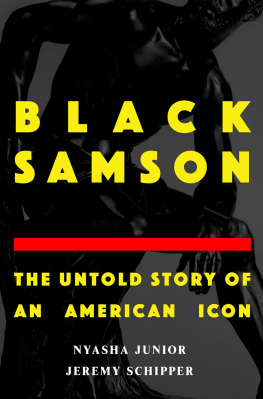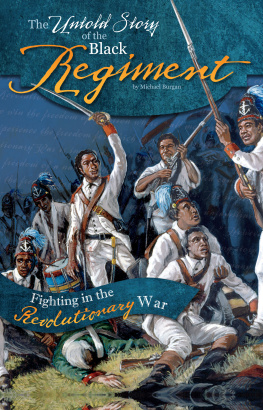Jeremy Schipper - Black Samson: The Untold Story of an American Icon
Here you can read online Jeremy Schipper - Black Samson: The Untold Story of an American Icon full text of the book (entire story) in english for free. Download pdf and epub, get meaning, cover and reviews about this ebook. year: 2020, publisher: Oxford University Press, genre: Art. Description of the work, (preface) as well as reviews are available. Best literature library LitArk.com created for fans of good reading and offers a wide selection of genres:
Romance novel
Science fiction
Adventure
Detective
Science
History
Home and family
Prose
Art
Politics
Computer
Non-fiction
Religion
Business
Children
Humor
Choose a favorite category and find really read worthwhile books. Enjoy immersion in the world of imagination, feel the emotions of the characters or learn something new for yourself, make an fascinating discovery.
- Book:Black Samson: The Untold Story of an American Icon
- Author:
- Publisher:Oxford University Press
- Genre:
- Year:2020
- Rating:3 / 5
- Favourites:Add to favourites
- Your mark:
- 60
- 1
- 2
- 3
- 4
- 5
Black Samson: The Untold Story of an American Icon: summary, description and annotation
We offer to read an annotation, description, summary or preface (depends on what the author of the book "Black Samson: The Untold Story of an American Icon" wrote himself). If you haven't found the necessary information about the book — write in the comments, we will try to find it.
Black Samson: The Untold Story of an American Icon — read online for free the complete book (whole text) full work
Below is the text of the book, divided by pages. System saving the place of the last page read, allows you to conveniently read the book "Black Samson: The Untold Story of an American Icon" online for free, without having to search again every time where you left off. Put a bookmark, and you can go to the page where you finished reading at any time.
Font size:
Interval:
Bookmark:


Oxford University Press is a department of the University of Oxford. It furthers the Universitys objective of excellence in research, scholarship, and education by publishing worldwide. Oxford is a registered trade mark of Oxford University Press in the UK and certain other countries.
Published in the United States of America by Oxford University Press
198 Madison Avenue, New York, NY 10016, United States of America.
Oxford University Press 2020
All rights reserved. No part of this publication may be reproduced, stored in a retrieval system, or transmitted, in any form or by any means, without the prior permission in writing of Oxford University Press, or as expressly permitted by law, by license, or under terms agreed with the appropriate reproduction rights organization. Inquiries concerning reproduction outside the scope of the above should be sent to the Rights Department, Oxford University Press, at the address above.
You must not circulate this work in any other form and you must impose this same condition on any acquirer.
Library of Congress Cataloging-in-Publication Data
Names: Junior, Nyasha, author. | Schipper, Jeremy, author.
Title: Black Samson : the untold story of an American icon / Nyasha Junior and Jeremy Schipper.
Description: New York : Oxford University Press, [2020]. |
Includes bibliographical references and index.
Identifiers: LCCN 2019047199 (print) | LCCN 2019047200 (ebook) |
ISBN 9780190689780 (hardback) | ISBN 9780190689803 (epub) | ISBN 9780190936853
Subjects: LCSH: African American menRace identity. | Samson (Biblical judge)In literature. |
Samson (Biblical judge)Art. | African American men in literature. |
African American men in popular culture. | Bible. JudgesCriticism, interpretation, etc.
Classification: LCC E185.625 .J85 2020 (print) | LCC E185.625 (ebook) |
DDC 305.38/896073dc23
LC record available at https://lccn.loc.gov/2019047199
LC ebook record available at https://lccn.loc.gov/2019047200
We dedicate this book to the memory of Matthew Ewing, Sr.
Several colleagues provided helpful feedback on drafts of this work, including Timothy Beal, Douglas R. Egerton, Herbert Marbury, Ellen Muehlberger, Justin Reed, Stephen Russell, Love Sechrest, Jeffrey Stackert, Linn Washington, and our colleagues in the Department of Religion at Temple University. We would like to thank Carly Crouch and Christopher Hayes for inviting us to present portions of our work as part of the David Allan Hubbard Old Testament Lecture Series at Fuller Theological Seminary in January 2019. We appreciate the tireless assistance of the staff of the Charles L. Blockson Afro-American Collection at Temple University and Temple University librarian Fred Rowland. This book was funded in part by Temple Universitys Presidential Humanities and Arts Research Program.
If the world fails to give you consideration, because you are black men, because you are Negroes, four hundred millions of you shall, through organization, shake the pillars of the universe and bring down creation, even as Samson brought down the temple upon his head and upon the heads of the Philistines.
Marcus Garvey, 1923
Like any story of race in America, the story of Black Samson is not linear. The first three chapters of this book cover Black Samson traditions mostly in the nineteenth century. The last four chapters focus primarily on the twentieth and twenty-first centuries. We will move back and forth at times in order to link various uses of Black Samson in different historical periods. In this chapter, we discuss physical descriptions of Samson in the Bible, provide examples of the use of Black Samson in America, and consider why the biblical story of Samson may have become associated with African Americans.
The Bible covers Samsons entire life story in only four short chapters (Judges 1316). The King James Version of the Bible, which is the version we quote throughout this book, needs barely over three thousand words to translate these chapters into English (consult the In contrast, the story of Abraham and Sarah occupies thirteen chapters in the book of Genesis. Joseph also gets thirteen chapters in Genesis and a lavish Broadway musical. Queen Esther gets ten chapters and an entire biblical book named after her. The story of King David spans three books of the Bible and then is recapped in 1 and 2 Chronicles. Mosess story spans four lengthy books: Exodus, Leviticus, Numbers, and Deuteronomy. Compared with other major biblical figures, Samsons story receives relatively little attention. Outside of the book of Judges, he appears only one other time in the Bible, in a passing reference to him buried in a laundry list of ancient heroes of faith in the New Testament (Hebrews 11:32). He is never mentioned in any ancient Egyptian or Mesopotamian literature outside of the Bible, and there is no archeological evidence of his existence.
Moreover, nothing in the few biblical descriptions of Samsons appearance accounts for his later racialization as Black. The Bible never describes his eye color, skin color, hair texture, or phenotype.
Despite this lack of physical description, the name Samson became linked with enslaved and free African Americans as early as the eighteenth century. For example, a document from the session of the Council of Maryland held on May 17, 1738, requests a pardon for Negro Sampson a slave belonging to John Rider Esq now under Sentence of Death in Dorchester Country.
It is not surprising to find references to free and enslaved men of African descent named Samson in these eighteenth-century documents. In colonial America, free and enslaved people were often named after characters from biblical texts or from Greek or Roman classical literature. There are records of enslaved and free persons of African descent named Abraham, Hagar, Hercules, Moses, Sarah, and many other names. Yet, while many of these names come from the Bible, when slaveholders gave these names to the persons whom they enslaved, they did not necessarily intend to connect the enslaved person to the biblical stories about their namesakes.and forced him into labor (Judges 16:2130). Biblical names are not always meant as allusions to biblical stories.
Nevertheless, by the early nineteenth century, opponents of slavery had enlisted the biblical Samson in their cause. Although these early anti-slavery advocates did not necessarily interpret the biblical character as a Black man, they applied parts of Samsons story to racially charged issues in the United States. A memoir published in 1810 provides the earliest evidence of an enslaved Africans interpretation of the Samson story. In this memoir, Boyrereau Brinch, nicknamed Jeffrey Brace, recalled how he was forced to fight in the Revolutionary War in 1777 when his slaveholder Benjamin Stiles was drafted. Brace noted the irony of an enslaved man fighting for his oppressors independence. He recounted:
I also entered the banners of freedom. Alas! Poor African Slave, to liberate freeman, my tyrants. I contemplated going to Barbadoes [where he was first enslaved] to avenge myself and my country, in which I justified myself by Samsons prayer, when he prayed God to give him strength that he might avenge himself upon the Philistines, and God gave him the strength he prayed for.
Brace refers to Samsons dying plea for vengeance moments before he brings the Philistine temple down. Samson prays, O Lord GOD, remember me, I pray thee, and strengthen me, I pray thee, only this once, O God, that I may be at once avenged of the Philistines for my two eyes (Judges 16:28). Although Brace does not necessarily interpret Samson as a Black man, he finds biblical support for avenging his enslavement by linking it with Samsons desire for revenge, which Samson expresses throughout his battles with the Philistines (Judges 15:78, 11).
Font size:
Interval:
Bookmark:
Similar books «Black Samson: The Untold Story of an American Icon»
Look at similar books to Black Samson: The Untold Story of an American Icon. We have selected literature similar in name and meaning in the hope of providing readers with more options to find new, interesting, not yet read works.
Discussion, reviews of the book Black Samson: The Untold Story of an American Icon and just readers' own opinions. Leave your comments, write what you think about the work, its meaning or the main characters. Specify what exactly you liked and what you didn't like, and why you think so.








